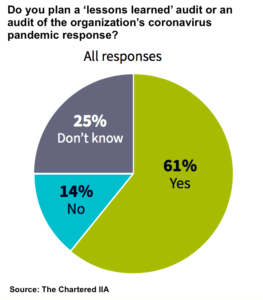
Furloughs and redeployments during the COVID-19 pandemic and resulting lockdowns are wreaking havoc on the work of internal auditors in the United Kingdom and Ireland, a new survey conducted by the Chartered Institute of Internal Auditors finds.
Chartered IIA surveyed more than 225 chief audit executives to assess the impact of the global pandemic on internal audit functions, and found that a “significant” number of audit professionals were unable to carry out internal audit functions, the survey indicates.
“Today’s research demonstrates just what a profound impact and disruptive effect the coronavirus crisis has had on corporate governance across all sectors in the U.K. While I applaud the ways in which the internal audit profession has adapted and shown resilience in the face of these challenges, there are some alarming findings which suggest critical work has not been undertaken during lockdown,” says Chartered IIA CEO John Wood.
Shifting Responsibilities
During the early summer months of 2020, 45 percent of surveyed chief audit executives were redeployed to support other areas of their businesses. A quarter said they were asked to shift to the oversight, risk, or compliance functions. Fifteen percent of internal audit teams were furloughed, and more than one-third of respondents said their audit committee chair was not consulted on decisions to furlough or redeploy staff members.
 “We found that a sizeable amount of internal audit teams were not doing any internal audit work at the time when we carried out the survey,” the report states. “While we recognized these decisions were driven by urgent business needs, this was somewhat concerning at a time when we were seeing a whole range of business-critical risks being exacerbated as a result of the crisis.”
“We found that a sizeable amount of internal audit teams were not doing any internal audit work at the time when we carried out the survey,” the report states. “While we recognized these decisions were driven by urgent business needs, this was somewhat concerning at a time when we were seeing a whole range of business-critical risks being exacerbated as a result of the crisis.”
Some internal audit leaders say the pandemic is creating more work for internal audit. More than one-third of chief audit executives said their teams’ working hours were increased to meet the demand for independent, objective assurance. And 63 percent reported minimal challenges meeting specific regulatory requirements at this time. Almost 8 in 10 said they were in touch with the audit committee chair on a daily, weekly, or monthly basis.
‘Lessons Learned’ Audits
Looking to the future, 61 percent of respondents say they will conduct a “lessons learned” audit on their organization’s response to COVID-19. Another 14 percent said their organizations would not be conducting such an audit and 25 percent said they either don’t know or aren’t yet sure. “Given the significant impact that the coronavirus pandemic has had on organizations then chief audit executives should give serious consideration to a lessons learned audit. Such audits can be vital in helping to support the organization to respond more effectively to crises in the future,” the report states.
Meanwhile, Chartered IIA is calling for stronger corporate governance measures in the United Kingdom, including the appointment of an audit regulator to oversee governance across the country. ![]()
Elizabeth Mullen is an editorial consultant for Internal Audit 360°.


Even if a lessons learned audit is not conducted, Internal Audit departments should include a lessons learned discussion in their risk assessment process with both Management and Internal Audit Staff.